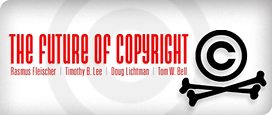I think the discussion so far has been really interesting, but I’d like to see Rasmus Fleischer and Doug Lichtman engage one another’s arguments more directly. Lichtman’s essay strikes me as a solid defense of the public goods argument for copyright. I think he’s right to be concerned that without copyright, society will suffer from the underproduction of certain categories of copyrighted works.
But I think Lichtman may have ducked Fleischer’s core argument: that regardless of copyright’s desirability, copyright protections just won’t be enforceable in the future, at least not without adopting the kinds of police state tactics Tom W. Bell warns us about. We’re now ten years out from the passage of the No Electronic Theft Act and the Digital Millennium Copyright Act, and five years into the Recording Industry Association of America’s legal campaign against file sharers. I see little reason to be optimistic about these anti-piracy campaigns. And as Fleischer points out, things are likely to get harder, not easier, than they are now.
The fundamental problem, I think, is that every successful legal regime works in tandem with a set of social norms and economic constraints that do most of the heavy lifting. Laws against burglary work mostly because most people have internalized norms against theft, and because we all have locks on our doors. The actual anti-burglary laws just play clean-up, catching the rare individual who isn’t deterred by the locks or the social pressures. If we lived in a society in which no one had locks on their doors and most people thought burglary was OK, no conceivable set of legal sanctions could keep burglary under control.
There is evidence that that’s the world we’re heading toward with regard to copyright law. The most important part of the 20th-century copyright-enforcement regime was the fact that the technologies for efficient duplication and distribution of copyrighted works were very expensive. That’s obviously no longer true. Digital rights management vendors portray their products as the digital equivalent of locks on our doors, but DRM is woefully inadequate to the goal of preventing unauthorized copying. And David Pogue claims that hardly any of today’s college students believe there’s anything morally objectionable about peer-to-peer file sharing. In a world where there are no practical barriers to file sharing, and where file sharing carries no social stigma, it’s simply naive to think that the law can singlehandedly prevent copying.
I’d be interested to learn if Lichtman shares Fleischer’s (and my) pessimism about the enforceability of the existing rules of copyright. If not, what is Fleischer’s analysis missing? And if so, how should copyright law adapt? I agree with Lichtman that the full-on abandonment of copyright law would be going overboard, but I think it’s pretty obvious that some changes are needed.
On the other hand, I note that Fleischer carefully avoids reaching a specific conclusion about how copyright law should be changed, but Lichtman seems to assume that Fleischer wants to see copyright abolished. Assuming that’s true, I’d like to see Fleischer address Lichtman’s point about the potential disruption that could result.
Lichtman is quite right that copyright helps to solve market failures that would otherwise lead to the underproduction of certain kinds of creative works. I’m not worried about music; there’s no shortage of people who are willing to make music whether or not they’re able to make a living at it. But I think there are categories of movies, books, and software that would be underproduced in the absence of copyright protection. I like $100 million blockbusters, for example, and it’s not clear to me how the creation of such a movie would be financed if there were thousands of pirate movie theaters that started playing new blockbusters within days of their release.
The war on personal file sharing may be hopeless, but it will continue to be eminently practical to prevent copyright infringement by commercial entities such as movie theaters. If Fleischer is in favor of abolishing copyright, I would be curious to know how he envisions the creation of big-budget motion pictures. And if he’s not in favor of abolishing copyright, how does he think the law ought to change?

